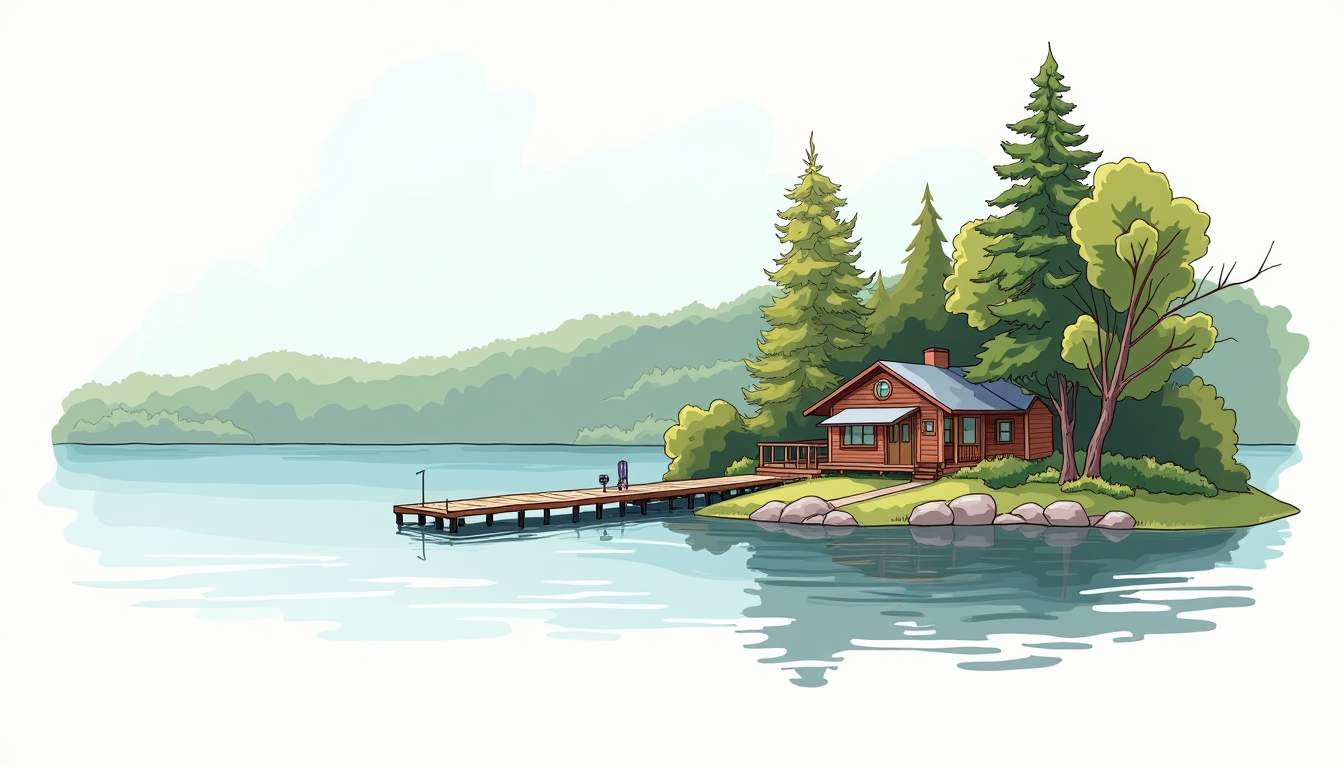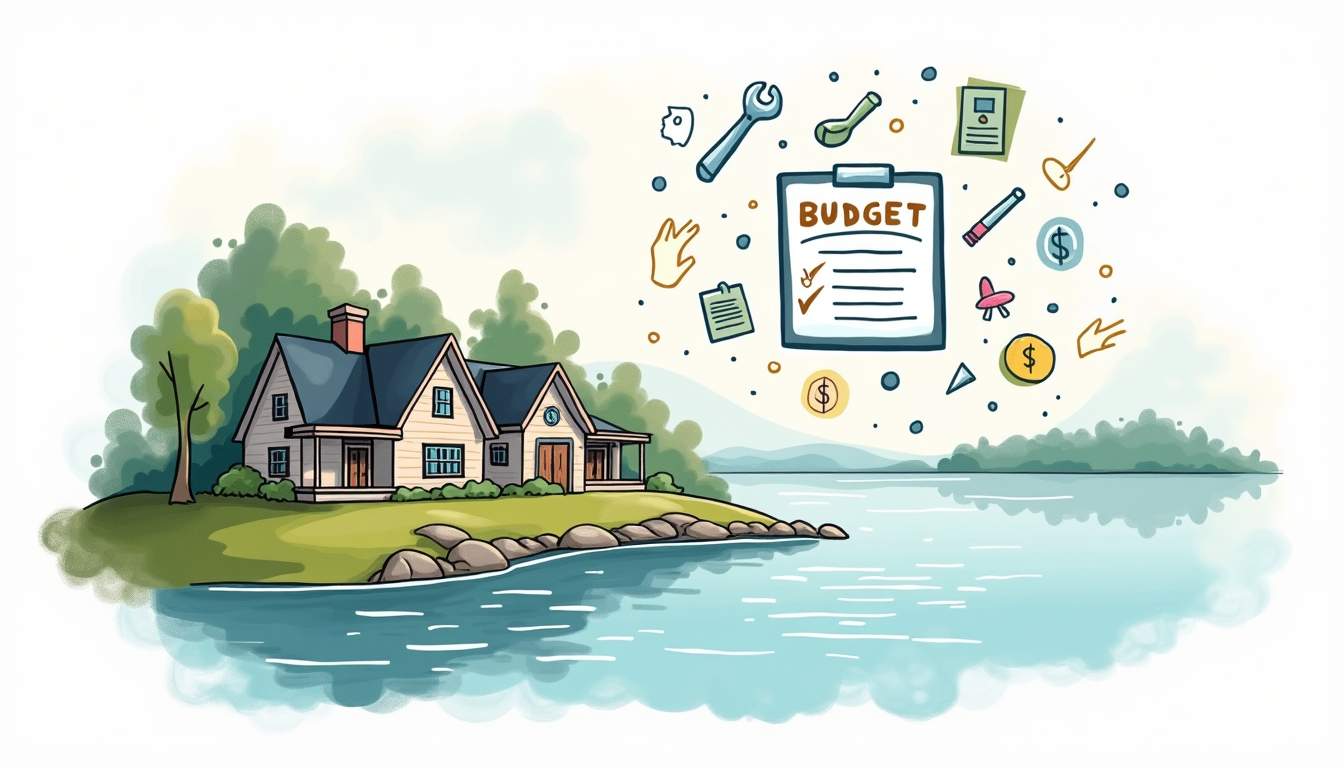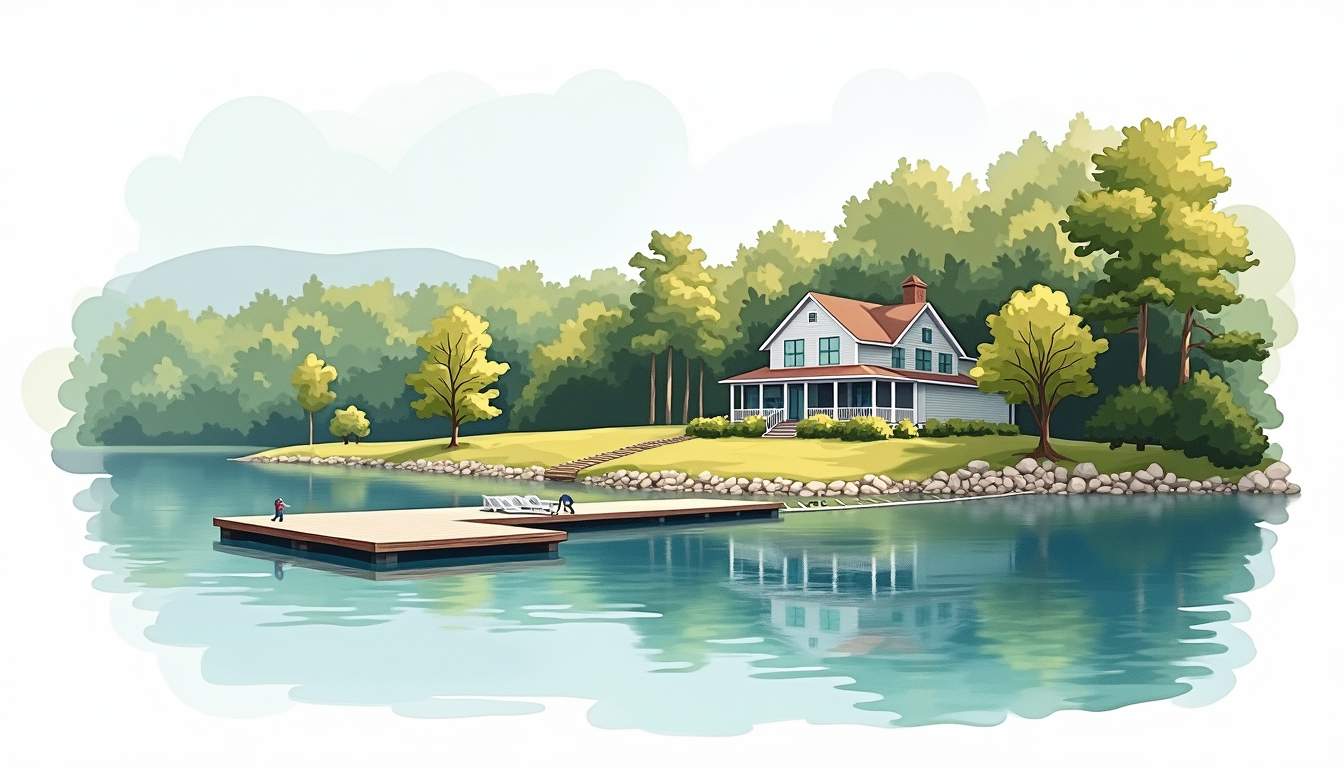
Purchasing a home with private lake access in East Tennessee means investing in more than a property: it means acquiring a lifestyle. From gentle coves and quiet fisheries to communities centered around waterfront recreation, East TN offers a variety of lake-adjacent options. This guide explains the practical and lifestyle considerations buyers should weigh, from choosing the right neighborhood to navigating legal, maintenance, and financing matters.
East Tennessee's landscape is defined by rolling hills, hardwood forests, and a network of reservoirs and natural lakes. The region combines scenic beauty with relatively easy access to urban centers like Knoxville and Chattanooga, plus the Great Smoky Mountains. Private lake access homes allow for boating, fishing, swimming, and lakeside entertaining without the crowds of public recreation areas.
Beyond recreation, living near water can improve quality of life. Water views tend to reduce stress and provide a calming backdrop for daily routines. For many, morning coffee on a dock or an evening walk along the shoreline becomes a core part of home life. Properties with private access also often hold strong resale appeal, especially when situated on well-kept lakes with healthy ecosystems and nearby amenities.
“Private lake access” can mean different things depending on the community. Some homes have deeded access—exclusive rights recorded in the property deed—while others belong to homeowners' associations (HOAs) that manage shared docks, boat slips, and beachfronts. A few properties have true private shoreline ownership where the parcel includes lakefront land and private dock rights.
Understanding the type of access is crucial. Deeded access tends to be the most secure for long-term use, but HOA-managed access often provides amenities like maintained boat launches, community docks, and parking. Private ownership of shoreline may come with higher maintenance responsibility but offers the most control.
East Tennessee features several notable lakes and waterfront communities. Norris Lake is famous for its clear water and rocky shoreline, attracting boaters and anglers. Cherokee Lake, closer to suburban areas, has more residential development and broad expanses of navigable water. Fort Loudoun Lake near Knoxville is convenient for commuters who want quick access to urban services while living lakeside. Smaller natural lakes and private reservoirs also exist within mountain communities and gated developments.

Each lake has its own character. Norris Lake often appeals to buyers seeking seclusion and deep coves. Cherokee Lake suits water-sports enthusiasts and families wanting more social marina environments. Fort Loudoun is practical for buyers prioritizing proximity to schools, hospitals, and employment centers. Research local shoreline regulations and flood maps for the specific lake being considered.
Buying a lakeside home requires budgeting for multiple ongoing and one-time costs beyond the mortgage. Shoreline upkeep, dock construction or repair, erosion control, and dock insurance are common expenses for waterfront properties. If the property uses an HOA-managed dock, expect association dues that cover common-area maintenance, insurance, and utilities for shared facilities.

Insurance premiums for waterfront homes can be higher, especially if flood risk exists. While many East TN lakes are reservoirs with managed water levels, localized flooding and storm damage remain possibilities. A thorough cost analysis should include annual maintenance, utilities for dock lighting or pumps, septic or sewer inspections, and potential dredging or shoreline stabilization work.
Water views and access can increase assessed property values. Local tax rates vary, and some counties have specific appraisal practices for waterfront parcels. Request recent tax assessments and speak with local real estate professionals to anticipate annual tax liabilities. Also factor in potential special assessments for community shoreline projects or HOA-initiated improvements.
Financing waterfront homes is similar to other residential mortgages, but lenders often consider factors unique to lake properties. Properties with trodden shoreline, shared docks, or deeded access generally qualify for conventional loans, but appraisals must reflect accurate comparables. If a property includes unique features—like a private dock or boathouse—the appraiser may need to document their value carefully.

Loan-to-value ratios, credit requirements, and interest rates are typically in line with standard mortgage products. However, financing for undeveloped waterfront lots or properties with complicated access rights can be stricter. For vacant waterfront parcels, expect higher down payments and possibly shorter loan terms from lenders who perceive greater risk.
Inspections for lakeside homes should go beyond the standard home inspection. Add a shoreline assessment to evaluate erosion, stability of slopes, and signs of previous mitigation work. A qualified marine or dock inspector can evaluate the dock's structural soundness, pilings, electrical connections, and condition of decking materials.
Septic systems deserve attention, particularly in remote or rural lakeside locations. Runoff from rainfall and proximity to water can stress systems. If the property is connected to municipal sewer, verify that service lines are active and not subject to seasonal interruptions. Also, check for any environmental restrictions or conservation easements that limit shoreline alteration.
Water quality impacts recreational use and long-term property enjoyment. Harmful algal blooms, sedimentation, and invasive aquatic plants can reduce water clarity and limit boating. Local watershed organizations, county extension services, and state environmental agencies often provide water quality reports. Request recent testing information or guidance specific to the lake.
Confirm the legal nature of lake access through a title search and review of plat maps. Deeded access, easements, and recorded covenants will determine what is and isn't permitted. Shared easements may allow neighbor passage over private property to reach the lake, which can affect privacy. Similarly, HOAs often impose rules governing dock placement, boat sizes, and noise—understanding these rules before purchase avoids surprises.
Riparian rights and public navigation laws can be complex. In Tennessee, the interplay between private property lines and navigable waters affects what owners can legally do along the shoreline. Consulting a local real estate attorney or title company familiar with waterfront matters is wise when deed language or easements are unclear.
Daily life on a lake involves maintenance and seasonal routines. Docks require periodic inspection and treatment, especially if constructed of wood. Boat owners should plan for winterization and storage; some marinas offer seasonal slips or dry storage. Powerboats, pontoons, and personal watercraft all have different storage and launching needs that influence property utility.
Consider noise and privacy when selecting a spot. Certain coves and channels experience heavy boat traffic on summer weekends, while others remain quiet. Assess proximity to public boat ramps and popular recreational spots—properties near highly used ramps often see more transient traffic and noise. For those prioritizing solitude, prioritize deeper coves and smaller offshoots of the lake.
Safety on the water is paramount. Look for well-lit docks, safe ladder access, and clear signage where necessary. Building good relations with neighbors helps in maintaining shared areas and coordinating boat traffic. Community groups and neighborhood associations frequently organize safety and environmental initiatives, which can be beneficial for long-term stewardship.
Negotiation strategies for waterfront properties often center on contingencies for inspection results and clear delineation of access rights. Include specific language in offers addressing the condition of the dock, shoreline stability, and any items included in the sale such as boat lifts, slip agreements, or watercraft. Sellers sometimes overestimate the value of unique features; an inspection-backed negotiation helps align price with real condition.
During closing, verify that all easements, HOA covenants, and title matters are resolved. Lender-required surveys may be necessary to confirm boundaries and dock locations. Obtain copies of community rules and recent meeting minutes if the property belongs to an HOA; these documents can reveal planned assessments or disputes affecting the shoreline.
1. Prioritize professional inspections tailored to waterfront issues—dock, shoreline, and septic. Standard home inspections are necessary but insufficient on their own. 2. Verify access rights in writing—deeds, recorded easements, and HOA documents matter. Oral assurances are not reliable. 3. Check local zoning and permitting rules for docks and shoreline improvements; some counties require permits for new construction or major repairs. 4. Explore community culture—some lake communities are quiet and residential, while others host weekend events and heavy boating. Visit at different times to get a real sense of activity levels. 5. Factor in long-term costs—shoreline maintenance, insurance, HOA dues, and potential special assessments can change overall affordability.
Buying a private lake access home in East Tennessee can provide rewarding recreational opportunities and a unique connection to nature. Careful due diligence, informed financing choices, and realistic budgeting for maintenance and insurance are essential. By understanding the differences between deeded, HOA-managed, and privately owned shoreline, evaluating water quality, and inspecting docks and septic systems, buyers can select a property that fits both lifestyle expectations and financial plans.
Whether seeking a peaceful retreat near a secluded cove or a family-friendly home with easy access to marinas and boat ramps, East Tennessee's lakes have much to offer. Patience and preparation will pay off, ensuring that the new home delivers both the beauty of the water and the practical comforts of everyday life.
Embrace the lake lifestyle with the luxury and comfort of Tennessee National, a premier gated community offering private marina access, waterfront dining, and over 20 exclusive member amenities. Whether you’re seeking a move-in ready home or a custom build near serene waters and scenic nature trails, Tennessee National provides the perfect balance of relaxation and recreation. Schedule a private tour today and start making unforgettable memories in East Tennessee’s most vibrant lake community.